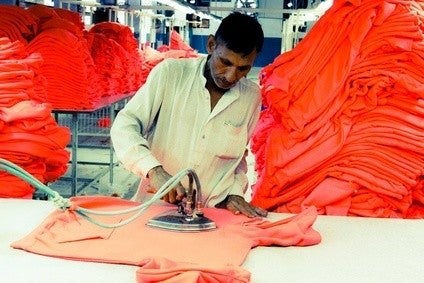
A new report into the European Union’s Generalised Scheme of Preferences (GSP) trade initiative – under which textiles and apparel make up nearly half of all imports – suggests it continues to have a positive impact on developing economies, but that most beneficiaries still have areas requiring further improvement.
The ‘Report on the Generalised Scheme of Preferences covering the period 2016-2017′ notes that EU imports from least developed countries (LDCs) soared 38% to EUR23.5bn (US$29.2bn) between 2014 and 2016.
These so-called Everything But Arms (EBA) exports – one of the three GSP arrangements – receive zero tariff duties on all shipments except arms and ammunition, with the 49 beneficiary countries including apparel producers Bangladesh, Cambodia, Myanmar, Ethiopia, Madagascar and Haiti.
According to the report by the European Commission and the European External Action Service, within EBA, apparel and clothing represents 80% (EUR19bn) of all EU imports, followed by footwear (EUR923bn).
Within this, 66% of all EU imports under EBA come from Bangladesh (EUR15.6bn), followed by Cambodia (18% or EUR4.2bn) and Mozambique (4% or EUR965m).
The report also notes that between 2015 and 2016, EU imports under Standard GSP rose 3% to EUR32bn, and those under GSP+ increased by 5% to EUR7.5bn.

US Tariffs are shifting - will you react or anticipate?
Don’t let policy changes catch you off guard. Stay proactive with real-time data and expert analysis.
By GlobalDataThe Standard GSP reduces EU import duties for about 66% of all product categories; while the Special Incentive Arrangement for Sustainable Development and Good Governance (GSP+) grants full removal of tariffs on over 66% of product categories in return for implementing core international conventions on human and labour rights, and environmental protection.
GSP+ beneficiaries include apparel producers Pakistan, the Philippines and Sri Lanka, which was readmitted to the GSP+ scheme in May 2017, after having been removed in 2010.
Between 2014 and 2016, EU imports under GSP in total increased by 23% to EUR63bn. Again shipments were led by textiles and apparel, which made up 48% (EUR30bn) of total imports under GSP in 2016. This was followed by footwear in second place, but with only 9% (EUR5.8bn) of the total.
Apparel and footwear also constitute the two biggest EU imports under the Standard GSP arrangement, with shares of 23% (EUR7bn) and 15% (EUR5bn) respectively. Most EU imports benefiting from trade preferences under Standard GSP come from India (53% or EUR16.6bn), followed by Vietnam (23% or EUR7.1bn) and Indonesia (16% or EUR5.2bn).
And again, under GSP+, apparel and clothing make up the largest 53% of EU imports (EUR4bn), followed by other textiles and fabrics (20% or EUR790m). 74% of all EU imports under GSP+ come from Pakistan, and 22% from the Philippines.
The report lists numerous examples of positive developments in GSP+ beneficiary countries, including the promotion of gender equality in the Philippines, and action on the rights of women and children in Pakistan.
It also says that overall, GSP+ countries have demonstrated progress in strengthening their national institutions and adopted legislation to promote human rights, labour rights, environmental protection and good governance.
However, “virtually all beneficiaries need to step up efforts on effective implementation, enactment and enforcement of legislation, providing action plans and policy frameworks to bring about change on the ground,” the review adds.
While not constituting a ‘pass or fail’ test, the GSP report focuses its detailed assessment on the GSP+, and is taken into account by the Commission when considering if there are sufficient grounds for initiating the procedures for temporarily withdrawing GSP+.
This could happen if a GSP+ beneficiary does not make progress (without legitimate and objective reasons) or if there is serious backtracking on commitments.
An enhanced EBA monitoring process is also underway for the two biggest EBA beneficiaries, Bangladesh and Cambodia, where the EU can have most impact regarding human rights breaches.
The GSP in detail
The Generalised Scheme of Preferences (GSP) consists of three arrangements – Standard GSP, GSP+ and Everything But Arms (EBA) – and is the EU’s main trade instrument to support developing countries. It allows them to pay fewer or no duties on exports to the EU in return for improving the implementation of core human and labour rights principles and standards.
Standard GSP reduces EU import duties for about 66% of all product categories from 23 countries.
The Special Incentive Arrangement for Sustainable Development and Good Governance (GSP+) grants full removal of tariffs on over 66% of product categories from 10 vulnerable countries in return for the effective implementation of 27 core international conventions on human and labour rights, environmental protection and good governance.
The EBA arrangement grants full duty free and quota free access to the EU for all products (except arms and ammunition) from 49 UN-listed Least Developed Countries (LDCs).
Beneficiaries of the EU’s standard gsp, GSP+ and EBA schemes
Standard EU GSP beneficiaries 2016-2017:
EU GSP+ beneficiaries 2016-2017:
EBA beneficiaries 2016-2017:




